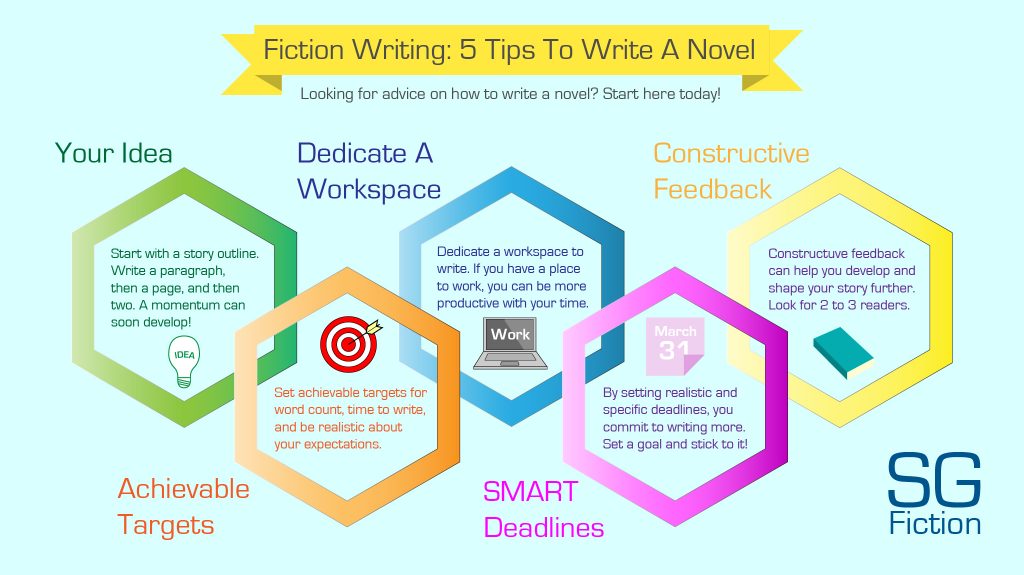The desire to start writing a book is something the majority of people would love to do. Looking for fiction writing advice? Check out these top 5 tips today!
In this Fiction Writing article, you will find advice in these areas:
- Why your seed of an idea is vital to propelling you through the journey of becoming an author,
- Why it’s important to set achievable targets so you can experience success regularly and feel a sense of achievement,
- The importance of a designated workspace and how it can boost your productivity as a writer, meaning you get more done with your writing time,
- Why committing to deadlines gives you a sense of pressure, ensuring that you remain focused and have an end goal in mind,
- How constructive feedback can help point out areas of your book that require your attention, meaning you can streamline your manuscript and mould it into the finished book.
Read the rest of the Fiction Writing article to learn 5 tips that you can apply to your home life and finish that novel you’ve always wanted to write.
Is Fiction Writing So Simple & Easy?
Are you looking to start the fiction writing process sooner rather than later? The desire to write a book is something the majority of people would love to do before they die. Along with learning a foreign language, and play a musical instrument, start writing a book is up there. If you’re someone who has the desire to write their own books, whether it is fiction or non-fiction, here are 5 achievable tips to start your journey today.
Referring to writing a book as a journey is an accurate one. Just this morning, I was searching for other ‘writing a book tips’ blog articles today, and I was faced with the same basic idea – that the steps were ‘simple’, ‘easy’, or ‘hassle-free’. If you ask any person who has ever written a fiction or non-fiction novel whether the process was ‘simple’, they would either laugh at you or yell in disgust.
Nothing about the fiction writing process is easy. From the day you start writing a book, until the day you publish it, you face every human emotion possible. As a fiction author who has published two fiction books himself, I can assure you that nothing about the process is easy.
If the writing process is so long and arduous, why should you start writing a book in the first place? That reason is simple, friends. Whether it is fiction writing, non-fiction writing, or composing a collection of poetry, you will experience a sense of achievement which is up there with the most rewarding you have felt.
Within this article, I won’t claim to present 5 simple steps to write a book today. Instead, I will offer you 5 top tips that are achievable and realistic for anyone with the dream to start writing a book. Armed with these top tips, you will feel more confident that you will not only start but finish and publish that book in the end.
Let’s get started!
Have The Idea? Start Writing A Book
It doesn’t matter whether you are a young writer or an experienced hand. The hardest area that many aspiring authors face is finding that idea to light the fire within them. That spark of inspiration is something you cannot force whether you are a first time writer or an experienced author like John Grisham or JK Rowling.
However, if you have that idea and it has what looks like the foundations of a beginning, middle, and an end, you have something to work with. By generating that seed of an idea, you can cultivate it into something much more substantial.
How do you start? By finding some time to sit down and outline what the story is about. Start with a paragraph, then a page, and then two. Once you start the writing process, you could find that is the action that causes an avalanche of creativity and, before you know it, you’re up all night writing.
Either way, once you find that idea, you must start writing the piece to see where it goes. With those baby steps and choosing to start writing a book, you are on the way to writing your first book. Whether it is fiction writing or non-fiction writing, you have made a start and can focus your energy into keeping the ball rolling.

Set Achievable Fiction Writing Word Targets
The fiction writing process is started, and you are trying to decide how best to keep up the motivation and momentum. This is a time that can be vital to the progress you make as a writer.
If you have a busy home life and a career that requires you to work long hours or work from home, you will likely have to fit writing in around everything else. Some of you will have more ‘free-time’ than others and will be able to structure a schedule at home to cultivate your writing time.
However, others will need to make considerable changes to allow some form of freedom to start writing a book. You may only be able to find an hour in the evening or have to get up early to fit in a writing slot. You could spend time composing a short scene or write characters to populate the story you have in mind. Either way, as long as you write something every day, you will continue to make progress towards finishing that book.
Once you have that allotted time laid out, it is vital that you set some form of goals for your writing process. You should aim to set realistic, achievable:
- Daily Word Targets,
- Weekly Word Targets, and
- Total Word Targets.
By ensuring that you set SMART targets for your fiction writing, you will set goals that are:
- Specific,
- Measurable,
- Achievable,
- Relevant, and
- Time-Bound.
Throughout this process, you must remember to give yourself an allowance if you miss a target once in a while. When you start writing a book, you are on a journey that takes as long as it takes. Therefore, you can always catch up if life gets in the way.
Set A Designated Workspace
When I decided to change career from teaching to become an author and full-time website copywriter, I knew it was vital that I had a designated place to work and set out a routine for a ‘working day’. This meant I was able to focus on my career change as well as write Inside Iris and Anna’s Awakening, my two novels.
For anyone who works from home, the importance of a designated workspace is central to becoming:
- More productive,
- More dedicated, and
- More focused.
When you start writing a book or a short story collection, you should look for an area within your home that can become your writer’s den. Within this area, you will be able to focus on your fiction writing and stitch the characters, plot, and setting into the story, you envisaged from the outset.
By simply having a separate area to work, you become mentally more aware of the task at hand. Therefore, your mind can transition into the appropriate gear and start grinding out words, pages, and chapters.
Commit To A Deadline
As one of the targets referred to earlier was a total word count, you should already have a finish line in your sights. By researching the desired length for books in your genre, you will be able to gauge how long the book ought to be.
Once you have the desired word length, you can then look at your realistic daily word count target and roughly set a date for the deadline of your first draft. This deadline will give you some form of pressure and will work in the same way a deadline applies in your professional life.
If you set a deadline to write a 90,000-word book in twelve months, then you should aim to finish the book in that time.
From that 90,000-words, you should be able to work out a weekly word-count to be completed on a specific day. By breaking down your targeted total word count and deadline, you will be able to set manageable short-term deadlines that will keep you focused on a weekly and then daily basis.
Many of us require these deadlines to get work done with any immediacy. By setting a series of targets that mount up to some form of completion or end date, you will have a specific roadmap to follow on your fiction writing journey.
By following those steps and committing to your writing time, you will not only start writing a book; you will finish it in the end. As a UK fiction writer, I can tell you that finishing a book is one accomplishment you should relish, so make sure you commit to that deadline.
Gather Constructive Feedback
With that precious finished manuscript in one hand and a celebratory beverage in the other, it is time to see what people think of the book you have just written. As a writer, you are too close to the project to gain any form of constructive, critical feedback before you publish your own book or send the manuscript to agents. This will mean you will:
- Feel too attached to certain characters,
- Be reluctant to take the axe to deadwood within the story,
- Not see possible plot holes and continuity errors, and
- Be unwilling to give yourself a break away from the story to let it breathe.
I have several beta readers who read through my stories and give me trusted, critical feedback that I can choose to apply to the book or overlook if required. To have these relationships with the people around you is essential. As a writer, you need to be able to walk away from a project for a while. Then you can hand it over to others to cast an eye over it. Then, after a month or so, your mind will likely feel more refreshed, and you will be able to make changes to the book with a clear head.
When fiction writing, it is the hardest thing to pick up the red pen and start circling, scoring out, and scything lines through some of your favourite dialogue or elements within a story. However, it is part of the process, friends, and your book will be better for it on the other side once the makeover is complete.

Fiction Writing: The Takeaway
When you start writing a book, it takes a lot of energy, planning, and dedication. Unfortunately, there are no quick fixes that will empower you in your fiction writing process to finish the book in a matter of days. It is a long process that will give you sleepless nights, but also a sense of achievement that will live with you for years.
As the author of two fiction books and the composer of a creative writing blog, I hope I have been able to offer you some useful and accessible advice that you can apply in your goal to write a book.
Use the advice above and assess how you feel you could fit it into your everyday life as best as possible. By adapting your home life and routines where possible, you could find yourself holding your debut book in a year’s time. Then, with any luck, you could be on the path to make money writing.
Have you got the idea? Start writing your book today and become the author you’ve always wanted to be.
Save and share this Fiction Writing infographic on your social media if you found this article useful!





Thank you for sharing, I’m always interested in how other people write 🙂
I’m your classic write by the seat of my pants, it doesn’t matter where I write, and I never have a plan or even an idea of how the story will go. I just have a character in my head showing me the movie that’s his story. I scribble it down as fast as possible.
If I try to plan or plot my characters shut up and I have no story at all.
But deadlines… Those are my friends, nothing makes me figure out where I stopped listening to a character faster than a pre-order deadline on the Zon. Loool
Thank you so much for commenting, Annabella. Every writer has their own technique. Good to hear you utilise deadlines well! Keep writing!